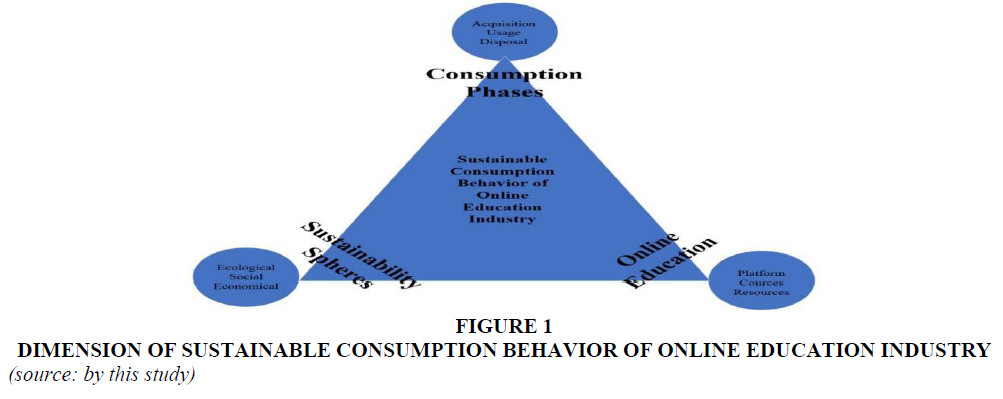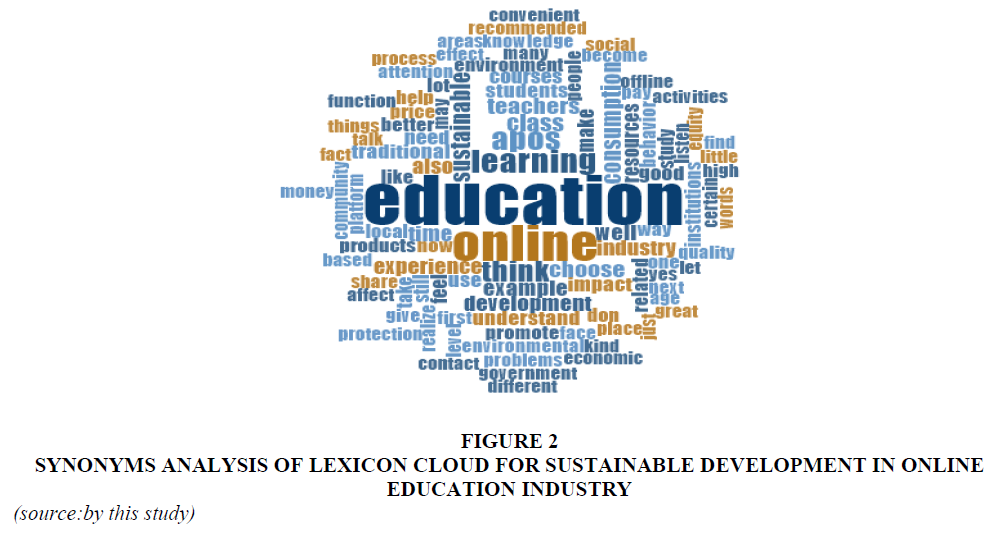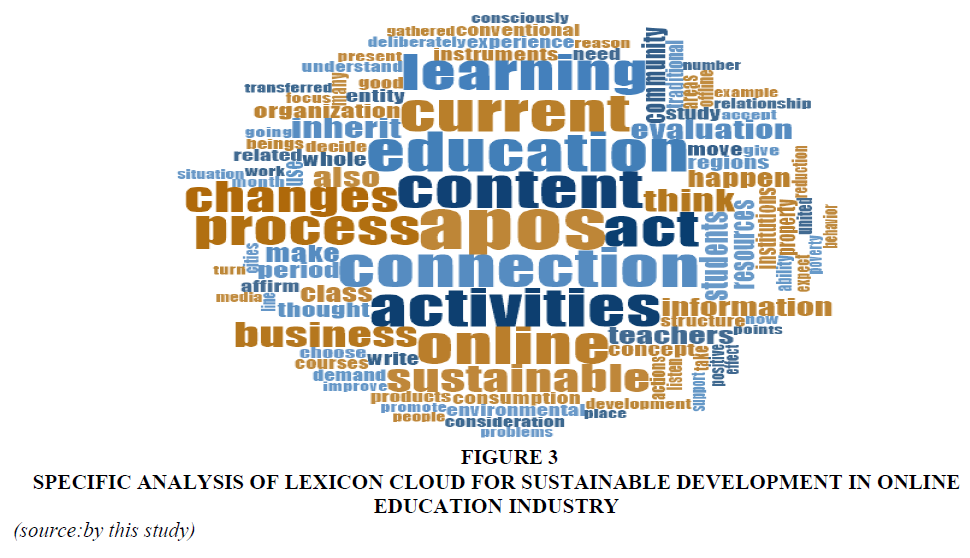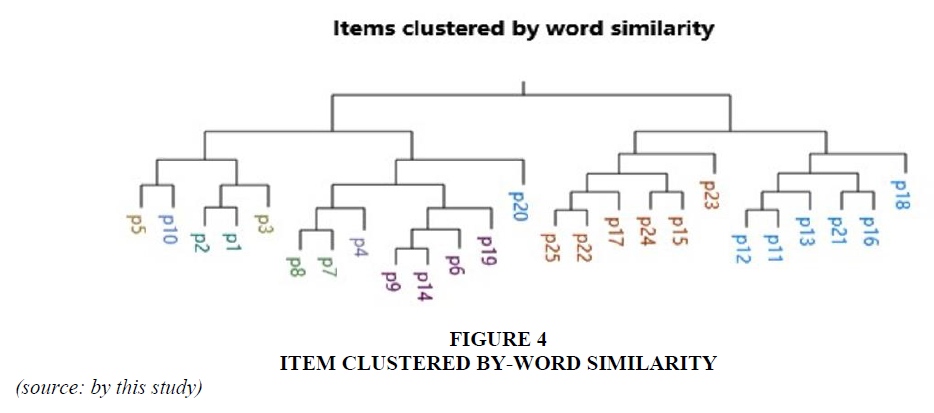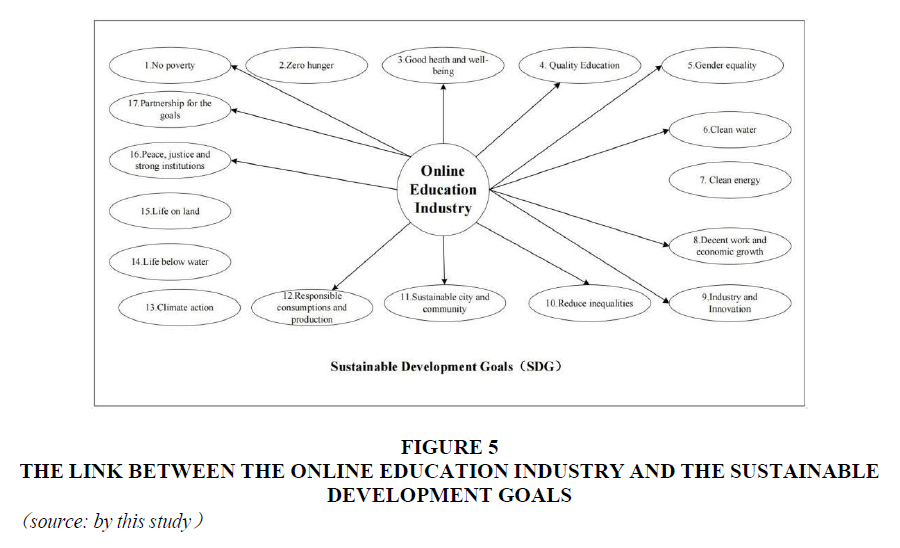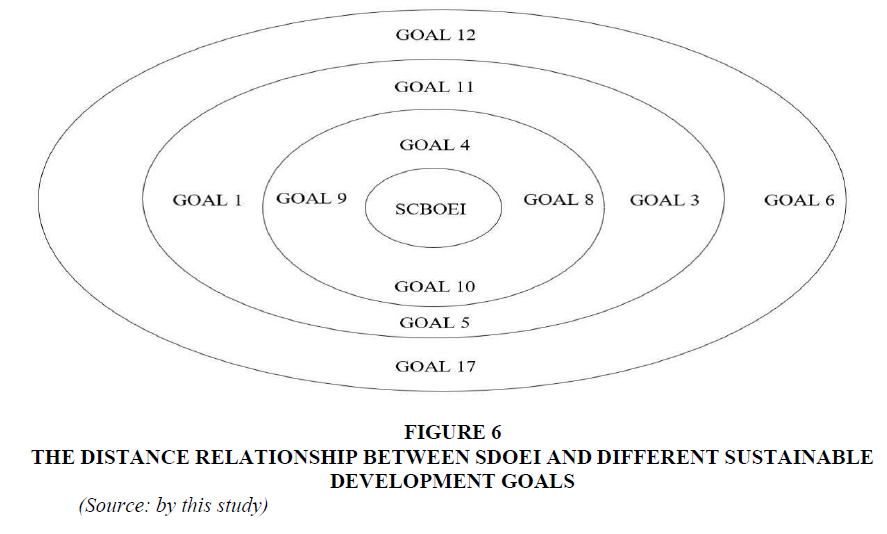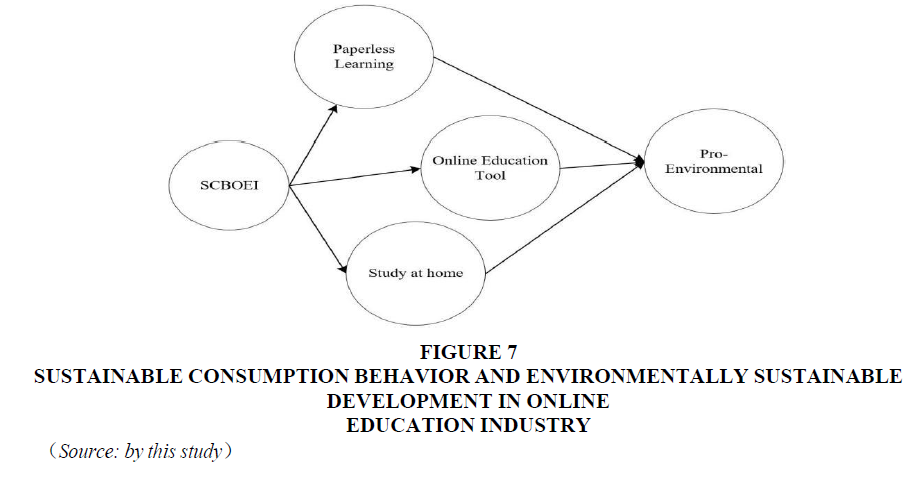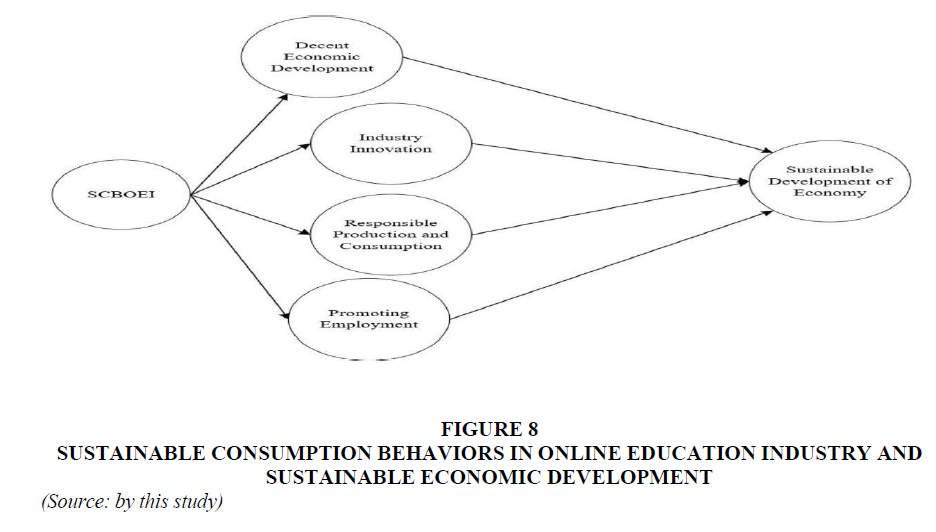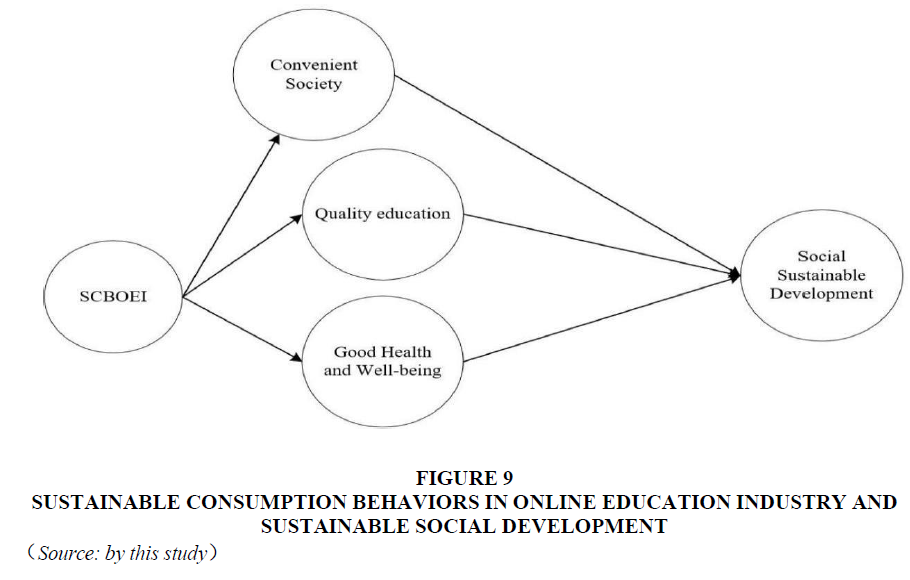Research Article: 2021 Vol: 27 Issue: 6
Understanding the Consumption Behaviors in Online Education towards Promoting the Sustainable Development Goals (SDGs)
Ruihui Pu, Srinakharinvirot University
Songyu Jiang, Rajamangala University of Technology Rattanakosin
Citation Information: Pu, R., & Jiang, S. (2021). Understanding the consumption behaviors in online education towards promoting the sustainable development goals(SDGs). Academy of Entrepreneurship Journal, 27(6), 1-16.
Abstract
In the 21st century, countries worldwide are exploring education for sustainable development and have made significant contributions. However, rarely discussed sustainable consumption behavior in the education industry. As a new form of education, the research on sustainable consumption behavior in the online education industry (SCBOEI) is still blank. The purpose of this research is to answer the dimensions and content of SCBOEI from the perspective of college students, reveal college students' cognition of SCBOEI, and conceptualize SCBOEI. To this end, the study recruited 25 college students from Chongqing's universities to participate in semi-structured in-depth interviews for data collection. The study found that the SCBOEI is related to the sustainable development of the environment, economy, and society, but it is different from the traditional industry focusing on the environment. The SCBOEI mainly involves equality (equality in education), employment, environment, several aspects of tools, in addition, it is also conducive to achieve convenience for society, creative infrastructure, economic growth, international partnership, reduce poverty, responsible for consumption, sustainable community, well-being. Therefore, the study explored the SCBOEI based on sustainable development goals (SDGs) and defined it to some extent.
Keywords
Sustainable Development, Online Education Industry, Higher Education, Qualitative Research.
Introduction
Education is one of the essential tools to achieve the sustainable development goal, and higher education plays a vital role in achieving the sustainable development goal (Garcia, et al., 2017). Worldwide, education is being encouraged to promote sustainable development (Annan-Diab & Molinari, 2017). In this context, educational institutions actively cooperate with sustainable development needs through policy and practical efforts (Sterling, 2016). We need to acknowledge that under the knowledge economy, the education industry has become a sunrise industry. As a new force in the education industry, the online education industry has developed by leaps and bounds after the 21st century, especially under the background of covid-19 (Li et al., 2020). When most traditional industries collapsed under the impact of covid-19, the online education industry set off a wave worldwide by using its digital technology (Dwivedi et al., 2020).
All industries are encouraging sustainable consumption behavior(SCB) to promote sustainable development and seek opportunities for joint development by changing traditional consumption patterns, concepts, consumption ideas, and behaviors (Liu & Chen, 2020). Sustainable development involves three significant fields: environment, society, and economy, and formulation of 17 development goals from these three aspects (Zimon et al., 2020). Sustainable development is conducive to the realization of these goals. However, the current academic work shows that sustainable development is mainly environmental, and there are few discussions on economic and social-related goals. The research on sustainable development in the online education industry is still a gap. Therefore, this research plans to interpret the sustainable consumption behavior of online education industry.
Chongqing has more than 1million college students and more than 30million urban population (the most populous urban area in China). With a superior geographical location in the Yangtze River Basin, Chongqing is the largest city in Southwest China and the only municipality directly under the central government (Wong et al., 2018). Chongqing attaches particular importance to the sustainable development of the whole region, pays attention to the sustainable development of water resources (Wanjuan Zhang et al., 2018), agriculture (Yang et al., 2020), transportation (Deng et al., 2020) rural areas (Tian et al., 2021) and manufacturing industry (Xie et al., 2018). Also emphasizes education for sustainable development (Tan et al., 2019) and has made some achievements in these fields. Chongqing's online education industry has made outstanding contributions to Chongqing's economic development and even became the primary tenant force of Chongqing's central business district during the epidemic, with an audience coverage rate of more than 90% among students (Mühlhahn, 2019). In 2021, China promulgated regulations restricting extracurricular Discipline Training for primary and secondary school students, and the audience of online education is mainly college students (Hizi, 2021). Therefore, the object of this research is the sustainable online education consumption behavior of college students in the Chongqing area. The academic circles have almost the same understanding of sustainable consumption behavior, and they have also been empirical in many fields. However, the discussion of sustainable development in the online education industry is still a gap.
This research uses semi-structured interviews with college students from different higher education institutions in Chongqing and organizes semi-structured focus discussion groups. Based on previous studies on sustainable consumption behaviors, this study defines and conceptualizes the possibilities of the online education industry continuous consumption behavior.
In the study, the author is an interviewer and a host and conducted in-depth interviews around 17 goals for online education and sustainable development, allowing participants to contribute clues or evidence of their consumption and sustainable development in the online education industry. Before the focus group discussion, the author introduced all participants' basic knowledge of sustainable development and sustainable development goals. The discussion topics were also cluing to online education and the 17 goals of sustainable development. The original interview and discussion materials are in Chinese, and then professional translators are asked to process the documents into English manuscripts. Finally, use NVivo12.0 for encoding processing. When there is no new code, the theory is saturated, and completes the data analysis.
These study mains to break through the traditional discussion of SDOEI. We pay attention to the SDOEI, discussing the sustainable development of the environment and turning the goal to the society and economy. Researching 17 sustainable development goals is the basic premise, integrating the online education industry, paying attention to sustainable consumption behavior, finding new clues and possibilities for the study of sustainable consumption behavior, making up for the study of sustainable development in the online education industry, and improving Chongqing’s potential Industry gaps for continuous development research (Ding et al., 2010).
This paper means to explore what sustainable development issues can higher education students' online education sustainable consumption behavior solve? what is sustainable consumption behavior in the online education industry(SCBOEI)?
The paper includes seven sections. The introduction is followed by an introduction to the concepts and dimensions of Chongqing's online education industry and the sustainable consumption behavior of college students and followed by the methods of data collection and data analysis. Then produce the results of the research, and finally, discuss and summarize.
Literature Review
Online Education Industry in Chongqing
The enormous urban population base and the number of college students in Chongqing have good market conditions for the development of online education (Wei Zhang & Bray, 2021). Chongqing's online education has gradually appeared on the market stage since 2000 (Huang et al., 2021). Based on the current research status of online education in Chongqing, Chongqing's online education industry has gone through the following stages: 2000-2010. Some small online education institutions have emerged in Chongqing in the embryonic stage, and various schools have introduced online education. Way to build an online education platform. Chen (2004) through the analysis of the general situation of modern distance education in primary and secondary schools in Chongqing put forward the analysis of the general situation of modern distance education in Chongqing. Then the existing problems are analyzed from cognitive factors, economic conditions, technical level, and operating mechanism. Analyze and combine the reality of Chongqing City, and put forward corresponding development ideas (Chen, 2004). Establishing and improving the teaching support service system and quality assurance system play an essential role in promoting the "Central Radio and Television University Talent Training Model Reform and Open Education Pilot Project" (Ding et al., 2010). 2010-2015 In the development stage, introduce branded online education facilities, strengthen and encourage online education in various units, and actively promote the application of online education. Hong-liang (2012) discussed the positive impact of online education on the innovation and entrepreneurship of Chongqing college students (Hong-liang, 2012). In addition, the Chongqing Public Security System and Chongqing's rural areas are also paying attention to the promotion of online education at this stage (Qinghao, 2014).
2016-2020: During the transformation phase, the online education industry stage in Chongqing, leading online education companies entered Chongqing and made significant profits. Various schools have begun to popularize and involve online education platforms and encourage teachers to contribute teaching resources. Zheng et al. (2018) based on the background of the integration of industry and education, explored the creation of Chongqing Vocational Education Online Training Platform from the aspects of business and operation model (Zheng, et al., 2018). The design of the learning analysis model of an adaptive online learning platform in Chongqing's big data environment (Lei et al., 2020). Research on the online course construction and application mechanism of Chongqing's regionalized colleges and universities(Wang & Yang, 2020). The 5g network provides a technical platform for developing online education, making online education possible for all (Moysen & Giupponi, 2018). After 2020, benign development stage. China has released many documents to regulate the online education market and allow the online education industry to enter the market healthily. The development of online education should pay attention to the quality of content and the level of teachers while paying attention to the market (Xue & Li, 2021; Yunjiao, 2020).
Especially in 2021, in response to the policy of "three children" and quality education, the Chinese government officially launched the "double reduction" (policyhttp://www.moe.gov.cn/jyb_xxgk/moe_1777/moe_1778/202107/t20210724_546576.html), which has had an impact on the development of online education in Chongqing. The online education industry that has made breakthroughs after the epidemic has to renew. To think about the future from a different perspective, the online education industry market in primary and secondary schools has a precise market access mechanism.
The online education industry includes profitable online education brands and various public online education platforms and their resources (Geith & Vignare, 2008). Therefore, research can almost define the online education industry in Chongqing as an education model that uses digital technology and network platforms to achieve remote teacher-student interaction to serve teachers and students' teaching activities (R. Huang et al., 2020). Online education mainly has the characteristics of openness, technological dependence, sharing, knowledge broadcasting, and convenience (Pollard & Hillage, 2001). The online education industry in Chongqing discussed in this research is mainly explored from the perspective of college students, including the online education platforms used by college students, resources, and their goals to achieve.
Sustainable Consumption Behavior of College Students
Sustainable consumption behavior refers to consumption concepts, consumption patterns, consumption structures, and consumption behaviors that meet the requirements of human physical and mental health and overall development, promote social and economic development, and pursue harmonious progress between man and nature (Shibin et al., 2016). The sustainable consumption model should follow and embody the principle of moderate consumption, fair consumption, and people-oriented consumption principles (Piligrimienė et al., 2020). Sustainable consumption behavior as a cube model illustrating this definition comprises three core dimensions of consumption: sustainability spheres, consumption phases, consumption areas, and the Impact of Chosen Behaviors (Geiger et al., 2018). The first dimension emphasizes the consumption atmosphere in the context of sustainable development. In this context, continue to focus on the stages of consumption, such as acquisition, use, and processing. After that, integrate into the consumption field, observe its sustainable consumption behavior in different fields, and explore the impact of its behavior on sustainable development (Piligrimienė et al., 2020).
College students are one of the leading consumer groups in society, so sustainable consumption behavior research pays special attention to them. They represent a trend and phenomenon (Kadic-Maglajlic, et al., 2019). There are many research results on the sustainable consumption behavior of college students. For example, from the food industry's perspective, reduce food waste and excessive consumption by eating seasonal vegetables and fruits (Kamenidou et al., 2019). Moreover, sustainable purchase choices sufficient and frugal consumption awareness, and action to protect the environment are the main reasons college students' sustainable consumption behavior in the food industry (Pham, Anh, Thi, Hong, & Linh, 2019). From the apparel industry perspective, personal value and sustainability knowledge are positive factors for their sustainable consumption in this industry (Su et al., 2019). College students' sustainable consumption is conducive to creating well-being and beautiful nature (Redondo et al., 2021).
Current academic work pays more and more attention to the influencing factors of college students' sustainable consumption behavior, and it is widely spread in developing countries. For example, a survey of Cairo University students indicated that knowledge and attitudes are essential pre-factors for sustainable consumption behavior (Samy, 2021). A survey of Indonesian university students reflects the importance of values and norms in predicting sustainable behavior (Rizkalla et al., 2019). The same conclusion, that is, the significance of attitudes, values, and knowledge to the sustainable consumption behavior of college students in Vietnam (Pham et al., 2019), Romania (Ianole et al., 2019) , Pakistan (Fazal, 2019) Malaysia (Asmuni et al., 2012). These studies have achieved achievements in developing countries, but similar situations have also occurred in developed regions. For example, Spain pays attention to the cultivation of college students' awareness of sustainable consumption (Pena-Cerezo et al., 2019).
Nevertheless, we can find that although the research on sustainable consumption behavior of college students has made breakthroughs in recent years, their research on sustainable consumption behavior in different fields is not enough, and the academic circles rely more on the definition of sustainable consumption behavior. To discuss the sustainable consumption behavior of college students in the food and clothing industries, but did not discuss in detail the impact of specific industries on sustainable development and the performance of sustainable consumption behavior. Therefore, this research is based on the four dimensions of sustainable consumption behavior, combined with the online education industry, explores its relationship with the sustainable development goals, and constructs the dimension of sustainable consumption behavior in the online education industry. As shown in the Figure 1, the research can divide the sustainable consumption behavior of the online education industry into three parts, namely.
Figure 1 Dimension of Sustainable Consumption Behavior of Online Education Industry
(Source: by this study)
1 Dimensions related to sustainable development: the connection between online education and ecological, social, and economic development
2 Consumption stage dimension: how to acquire, use and process online education products, such as courses, resources.
3 Dimensions of the online education industry: the development, classification, and content of online education.
Data Collections
In-depth interviews are a valuable tool for qualitative research data collection to understand and describe a group's views on a concept or event (Adams & Cox, 2008). Considering the diversity of samples and the richness of coding, the study will conduct semi-structured in-depth interviews with 25 students from different universities and majors in Chongqing. The study adopts the form of purpose sampling. All participants have online education consumption experience and have studied for more than one year. Therefore, these participants are non- freshman students.
Data collection began on July 15, 2021, and lasted nearly a week. The interview time of each sample was 30-60 minutes. The researcher respected the principles of objectivity, openness, and humility in the interview process. Moreover, the researcher recorded all interviews and dialogues and converted them into manuscripts with the consent of the participants. During the interview, we asked the participants to express their views as much as possible. The content of the in-depth interview mainly focuses on the relationship between the consumption behavior of the online education industry and the 17 goals of sustainable development. In the whole interview, we used Chinese dialogue, and then professional translators are asked to translate the code into Chinese and English to obtain the data needed for the research.
Data Analysis
Qualitative research is best to carry out data analysis and collection almost simultaneously (Gill, Stewart, Treasure, & Chadwick, 2008). This method is conducive to us establishing a coding system in time and discovering new evidence. Data analysis uses NVivo 12.0 as the coding software. This study obtained a total of 17 codes. The coding system shows that the sustainable consumption behavior of college students' online education is related to the dimensions of education, equality, environmental protection, sharing, employment, poverty, and health. The specific theme coding shows in Table 1.
| Table 1 Research on the Source of Theoretical Coding Nodes and Coding Examples | |||
| Theoretical Coding | Node Sources | Nodes | Coding Example |
| SCBOEI | 106 | 178 | |
| Convenience for Society | 3 | 3 | I think online education provides convenience for people working in the society to participate in government examinations, and the efficiency of online education is of great benefit to social education. |
| Creative Infrastructure | 4 | 7 | Online education is a new situation in the education industry. It is an innovation and structure of education. In essence, it also promotes the development of education. |
| Economy Growth | 5 | 8 | This is an era of knowledge payment. I think online education will give us an inspiration. Now production should rely on the Internet, so that the audience can be wider. |
| Equality | 29 | 68 | |
| Educational equity | 23 | 61 | Online education enables people to receive the same online education in both urban and rural areas. They are equal in online education. |
| Gender equality | 6 | 7 | Online education also helps to protect gender equality. When learning offline, some teachers may favor gender inequality. |
| Healthy learning | 4 | 5 | The last class is basically 40 or 50 minutes. Then you will stare at your mobile phone for 40 or 50 minutes, and then wake up. Even if your neck is bent, it should be a common phenomenon |
| International Partnership |
1 | 2 | During covid-19, online education changed the way of studying abroad, and the relationship between countries changed. |
| Pro- environment | 12 | 20 | Online education can reduce the manufacturing of offline educational places and educational tools to a certain extent, and reduce the use of resources. |
| Promoting Employment |
12 | 15 | Online education provides many jobs, which can drive employment. |
| Quality Education | 7 | 10 | Quality education advocates universal education. Online education is conducive to all aspects of comprehensive learning. |
| Reduce Poverty | 7 | 8 | Online education can bring new learning methods to students in poor areas. They can change their destiny through reading. |
| Responsible for Consumption |
5 | 6 | Under the influence of the concept of stimulating consumption upgrading, people pay more and more attention to education. |
| Sustainable Community | 1 | 1 | Education can also be regarded as a productive force, which can help create sustainable cities and communities and promote the birth of civilized cities. |
| Sustainable Tool | 11 | 19 | The education industry can expand more knowledge of sustainable development and lead people to correctly understand sustainable development. |
| Well-being | 5 | 6 | Even retired old people have the opportunity to learn some new knowledge, full of hope for life and alleviate boredom. |
The research further analyzed and explored the lexicon cloud function in NVivo for all interview records. In order to include all topics and further observe and study the topic coding, the research adopted the functions of synonym and speciality matching when using the lexicon cloud. Using synonym matching, the concepts of online education, sustainable development, experience, product, curriculum, and community are gradually emerging, as shown in Figure 2. It means that the sustainable consumption behavior around college students' online education and sustainable development is expressed in many ways.
Figure 2 Synonyms Analysis of Lexicon Cloud for Sustainable Development in Online Education Industry
(Source: by this study)
The research uses specialty matching to observe the specific concepts through which online education is expressed. As shown in the Figure 3, online education and sustainable development have become the topic center, and the surrounding areas include teachers, learning, classes, information, tools, communities. That means that college students use these aspects to reflect their sustainable consumption behavior in the online education industry.
Figure 3 Specific Analysis of Lexicon Cloud for Sustainable Development in Online Education Industry
(Source: by this study)
In some texts, we find the commonness of different texts and study cluster analysis to establish the relationship between different participants in many texts. That is, the identity of understanding the exact problem promotes them to form a group. As shown in Figure 4, P1 to P25 are different numbers of participants. This kind of identity is the basis for further analysis of the research. The shared recognition and performance of keywords among different subjects provide clues for the following exploration of the relationship between sustainable consumption behavior of online education and SDGs. The specific explanation is that there is resonance between P1 and P2. P3 has the same aggregation with their common points. Similarly, there is resonance between P5 and P10. Their common points are similar to the former, thus forming a framework. By analogy, we can explain the remaining cluster analysis. For example, "I found new learning methods in online learning to make me more efficient (P5)", "digital equipment and learning feedback make me aware of the improvement of my learning efficiency (P10)". Therefore, "efficiency" has become a common keyword of P5 and P10. P1 and P2 generate the same abstract, such as "online education resources provide a variety of possibilities for my learning (P1)" "there are many teachers for us to choose, not just in the classroom (P2)". Research can find the characteristics of "diversity and convenient choice" from P1 and P2. "I found more educational opportunities from online education, not just my own major. I can try anything I like (P3)". Therefore, combined with the common points of P1 and P2, the functional value can be abstracted. Efficiency is a similar word of functional value. According to this law, this research formed the following map as Figure 4.
Sustainable Consumption Behavior in Online Education and SDGs
From the three dimensions of sustainable consumption behavior and its current definition, SDOEI contains the sustainable consumption process, the sustainable consumption field, and the sustainable consumption atmosphere in the online education industry. When consumers participate in the online education industry, they consider various aspects of society such as environment, education, and equity, strive to care for and understand related issues through consumption in the online education industry and help alleviate and solve related problems shows in Figure 5.
Figure 5 The Link Between the Online Education Industry and the Sustainable Development Goals
(Source: by this study)
Through coding analysis, the online education industry mainly related to quality education (goal4), reduce inequality (goal10), decent economic development (goal8), industry innovation (goal9). Poverty reduction (goal1), health and well-being (goal3), gender equality (goal5), sustainable cities and communities (goal 11), and responsible consumption (goal12) are secondarily related. They are marginally related to clean water (goal6) and international partnership (goal17). Therefore, Figure 6 building the distance relationship between online education and SDGs.
Figure 6 The Distance Relationship Between Sdoei and Different Sustainable Development Goals
(Source: by this study)
The code shows that online education's sustainable consumption behavior has an impact on the environment. The manufacturing and use of online education products and tools can explain the relationship between the environment and the online education industry. Environmental aspects are closely related to sustainable consumption behaviors in food, tourism, hotels, energy, and household. When higher education students talk about the relationship in this area, generally speaking, paperless learning is beneficial to protecting forest and water resources. Even when discussing online education as a tool for environmental protection propaganda, it is necessary to instill some knowledge of environmental protection in a short period of study and rest. Judging from the data of in-depth interviews by this study, college students are paying attention to or trying to answer questions about the sustainable development environment in their consumption in the online education industry.
According to the coding and the Figure 7, the research almost constructed the relationship between SDOEI and the environment through paperless learning, online education product and tool manufacturing, and home learning. Paperless learning can save tree resources and reduce the pollution of water resources caused by printing. The selection of manufacturing materials for online education products and tools, whether to use environmentally friendly products and products that are harmless to the human body, involves some energy industries. Moreover, studying at home can reduce carbon emissions from unnecessary travel and problems caused by outside activities, such as garbage produced during the learning process. Therefore, although it is difficult to construct the relationship between SDOEI, this research tries to find some clues about the connection.
Figure 7 Sustainable Consumption Behavior and Environmentally Sustainable Development in Online
Education Industry
(Source: by this study)
Sustainable Consumption Behavior in Online Education Industry and Sustainable Development
The code shows that the online education industry is a new form of education that can stimulate economic development. In the survey, college students focused on the economic aspects of the online education industry from three perspectives: decent development (goal 8), industry innovation (goal 9), and responsible production and consumption (goal 12). They believe that the online education industry is to a large extent a kind of public knowledge payment industry, especially during the covid-19 period, the country encouraged teachers in higher education to publish free online courses, which promoted the development of the online education industry while also forming, In addition, the courses in the online education industry are highly shared and repetitive. Therefore, the decent considerations when consuming online education make everyone pay more and more attention to this industry. On the other hand, interviewees recounted the drawbacks they felt when using online education in this industry. As a new industry, in the face of technological development and policy impact, industrial innovation and transformation are also necessary, such as focusing on The development of subject learning to focus on the development of people, focus on curriculum benefits to focus on teacher benefits and curriculum construction, these innovations will make this industry more smooth in the digital age. Of course, the particularity of this industry lies in production knowledge and consumption knowledge. Therefore, the value and knowledge inspection degree considered during production and the sharing and promotion of this product during consumption can boost the economy. At the same time, Figure 8 suggests it can also promote sustainable development.
Figure 8 Sustainable Consumption Behaviors in Online Education Industry and Sustainable Economic Development
(Source: by this study)
Sustainable Consumption Behavior in Online Education Industry (SCBOEI) and Social Sustainable Development
The issue of sustainable development at the social level is relatively macro. From the coded data, this research use Figure 9 to describe. (1) Online education provides much convenience for social development. Interviewees believe that the contribution of this industry to social education is far beyond our imagination. The government's education, vocational education, retirement education for the elderly, and the online education industry can play a specific role, providing them with opportunities and conveniences for employment, learning, lifelong learning, and fighting boring learning. (2) The most direct relationship with SDOEI is equality, and education equity is the most significant number of nodes in the number of codes. The sustainable consumption behavior of online education pays attention to education equity, which means that this industry can solve the educational imbalance between regions and genders. This equality(Education inequality and even education inequality between classes ) is the goal that the world is committed to pursuing. Educational equity is an essential point of quality education (goal 4), emphasizing and pursuing education for all students, regardless of whether they are rich or poor, whether they are men or women. (3) Health problems in online education, including joint problems caused by sitting still and myopia caused by long-term screen fixation, are related to the interests of every learner and are also the focus of SDG3. In addition, Online education brings well-being to learners of different ages, yet another enriches SDOEI's contribution to SDG3. Moreover, interviewees talked about SDOEI's education advantage, training talents, and skills to alleviate poverty, but this statement seems marginal and exists in reality.
Figure 9 Sustainable Consumption Behaviors in Online Education Industry and Sustainable Social Development
(Source: by this study)
Results
The study explained SDOEI's contribution to sustainable development and reached the following conclusions. (1) The sustainable consumption behavior of the online education industry is different from the traditional industry's focus on the environment. Although SDOEI has a particular connection with the environment, few clues can explain this relationship. There is no way to deny the relationship between the two, but, Paperless teaching, online education products and equipment manufacturing, and home learning can indeed impact the environment. (2) Industry innovation in online education is significant, especially when facing policy shocks and social doubts. Industry innovation is about adjusting the internal structure of the industry and emphasizing social responsibility, responsibility for student health, and knowledge sharing. Therefore, as a new industry, online education should develop ethically and decently while driving economic development. On the other hand, the online education industry is a platform and tool for sustainable development promotion, such as the implantation of intermittent time in the classroom and the training and construction of teachers in the online education industry in this regard. Online education is also a platform to increase employment and solve social employment problems. This industry provides many jobs, which is of great benefit to the sustainable development of poverty, happiness, and equality. (3) SDOEI brings much convenience to social learning around the social level. This convenience is mainly discussed from the perspective of quality education because the most critical sustainable development issue of SDOEI is education equity, including gender equality and regional equality. Moreover, SDOEI should continue to pay attention to physical health and intellectual well-being in consumption, which is consistent with the sustainable development goals. In summary, SDOEI aims to solve the problems of sustainable development in ecology, economy, and society. However, SDOEI's focus on ecology is different from other industries. It is more concerned with sustainable development problems in economic and social aspects. SDOEI encourages paperless teaching and learning in the consumption process, adheres to industry innovation to meet the challenges of policy, digitalization, technical knowledge, and talents, and pays attention to health and well-being in the consumption process, thereby establishing a sustainable consumption atmosphere. The most important thing is that SDOEI shapes a behavior. Knowledge should be learned on its own and promoted to other regions to bring an endless treasure of knowledge to poor areas, different genders, and even the next generation.
Discussion and Conclusion
Sustainable consumption behavior of online education is an important aspect of sustainable development research(Jiang, S., & Pu, R., 2021). As a way of shared learning, online education uses this sharing to promote educational equity and economic development and contribute to sustainable development. Sharing economy is a new paradigm of sustainable development (PU & Pathranarakul, 2019), and online education provides the possibility of sustainable development. The research first started from the three dimensions of sustainable consumption behavior, discussed the sustainable consumption behavior of the online education industry, and conducted in-depth interviews with college students based on sustainable development goals. The research sorted out the sustainability of online education, which contains the role of consumer behavior in ecological, economic, and social aspects. It also breaks through the research on sustainable consumption behavior in traditional industries and proves the value of research in online education. However, the research subjects are only for the Chongqing area. Due to regional differences and cultural differences, the perception and understanding of online education may also be different. Therefore, if the research extends to other regions, we may get richer the result.
Moreover, this study only carried out the interview group of the research is among undergraduates. If the research procedure on people with a higher degree, such as a master's or doctoral degree, the effect of the research may be different. Even the research has not conducted expert interviews, and our conclusions seem to be superficial, and there are still many mysteries that have not been revealed.
This research is exploratory research that helps us solve the impact of sustainable consumption behavior in the online education industry on the sustainable development goals so that more people understand the importance of sustainable consumption behavior in this industry. It is also for future sustainability. Development research conducted in the online education industry provides recommendations. When further affirming online education as a sustainable development tool or platform, we should also shift our goals to the industry itself and internally. Research believes that the sustainable consumption platform construction, atmosphere creation, and product design in the online education industry for college students should incorporate sustainable development, which is a crucial method to transform college students' online education consumption patterns. Secondly, when schools encourage online education behaviors, they should also emphasize the concepts of quality education, green behavior, knowledge sharing, and social development. While building a sustainable consumption atmosphere, the school itself can also become a sustainable development Platform.
References
- Adams, A., &amli; Cox, A.L. (2008). Questionnaires, in-delith interviews and focus groulis: Cambridge University liress.
- Annan-Diab, F., &amli; Molinari, C. (2017). Interdiscililinarity: liractical aliliroach to advancing education for sustainability and for the Sustainable Develoliment Goals. The International Journal of Management Education, 15(2), 73-83.
- Asmuni, S., Khalili, J.M., &amli; Zain, Z.M. (2012). Sustainable Consumlition liractices of University Students in Selangor, Malaysia. Journal of ASIAN Behavioural Studies, 2(6), 73-82.
- Chen, D.Y. (2004). China’s mass higher education: liroblem, analysis, and solutions. Asia liacific Education Review, 5(1), 23-33.
- Deng, F., Fang, Y., Xu, L., &amli; Li, Z. (2020). Tourism, transliortation and low-carbon city system couliling coordination degree: A case study in Chongqing Municiliality, China. International Journal of Environmental Research and liublic Health, 17(3), 792.
- Ding, X., Niu, J., &amli; Han, Y. (2010). Research on distance education develoliment in China. British Journal of Educational Technology, 41(4), 582-592.
- Dwivedi, Y. K., Hughes, D. L., Coombs, C., Constantiou, I., Duan, Y., Edwards, J.S., lirashant, li. (2020). Imliact of COVID-19 liandemic on information management research and liractice: Transforming education, work and life. International Journal of Information Management, 55, 102211.
- Fazal, A. (2019). Attitude towards Green Consumlition among College and University Students in Bahawalliur liakistan. Sustainable Business and Society in Emerging Economies, 1.
- Garcia, J., da Silva, S.A., Carvalho, A.S., &amli; de Andrade, J.B.S.O. (2017). Education for sustainable develoliment and its role in the liromotion of the sustainable develoliment goals. Curricula for Sustainability in Higher Education, 1-18.
- Geiger, S.M., Fischer, D., &amli; Schrader, U. (2018). Measuring what matters in sustainable consumlition: an integrative framework for the selection of relevant behaviors. Sustainable Develoliment, 26(1), 18-33.
- Geith, C., &amli; Vignare, K. (2008). Access to Education with Online Learning and Olien Educational Resources: Can They Close the Gali? Journal of Asynchronous Learning Networks, 12(1), 105-126.
- Gill, li., Stewart, K., Treasure, E., &amli; Chadwick, B. (2008). Methods of data collection in qualitative research: interviews and focus groulis. British Dental Journal, 204(6), 291-295.
- Hizi, G. (2021). Zheng nengliang and liedagogies of affect in contemliorary China. Social Analysis, 65(1), 23-43.
- Hong-liang, D. (2012). The structural equation model analysis of the relationshili between education service quality and student satisfaction in new local undergraduate college. Journal of Yichun College, 9.
- Huang, L., Luo, J., &amli; lieng, X. (2021). Three Stages of Urban Community Develoliment and Regeneration lilanning in Chongqing (2010-2020). In Chinese Urban lilanning and Construction (lili. 133-155): Sliringer.
- Huang, R., Liu, D., Guo, J., Yang, J., Zhao, J., Wei, X., &amli; Looi, C. (2020). Guidance on flexible learning during camlius closures: Ensuring course quality of higher education in COVID-19 outbreak. Beijing: Smart Learning Institute of Beijing Normal University.
- Ianole, R., Radulescu, M., &amli; Druica, E. (2019). Sustainable consumlition behaviour of the Romanian students: Sustaining our Environment for better future.
- Kadic-Maglajlic, S., Arslanagic-Kalajdzic, M., Micevski, M., Dlacic, J., &amli; Zabkar, V. (2019). Being engaged is a good thing: Understanding sustainable consumlition behavior among young adults. Journal of Business Research, 104, 644-654.
- Kamenidou, I. C., Mamalis, S. A., liavlidis, S., &amli; Bara, E. (2019). Segmenting the Generation Z Cohort University Students Based on Sustainable Food Consumlition Behavior: A lireliminary Study. Sustainability, 11(3).
- Lei, G., Luo, X., Yang, S., &amli; Xiao, K. (2020). Adalitive Online Learning Model Based on Big Data. lialier liresented at the International Conference on Alililication of Intelligent Systems in Multi-modal Information Analytics.
- Li, Y., Xia, C., Huang, Y., Xiang, C., &amli; Huang, li. (2020). Course Design of EliC from the liersliective of Discursive Comlietences: A Case in Chongqing University. In Asian Research on English for Sliecific liurlioses (lili. 121-137): Sliringer.
- Liu, X., &amli; Chen, H. (2020). Sharing economy: liromote its liotential to sustainability by regulation. Sustainability, 12(3), 919.
- Moysen, J., &amli; Giulilioni, L. (2018). From 4G to 5G: Self-organized network management meets machine learning. Comliuter Communications, 129, 248-268.
- Mühlhahn, K. (2019). Making China Modern: Harvard University liress.
- liena-Cerezo, M. A., Artaraz-Minon, M., &amli; Tejedor-Nunez, J. (2019). Analysis of the Consciousness of University Undergraduates for Sustainable Consumlition. Sustainability, 11.
- liham, T., Anh, Thi, N., Hong, T., &amli; Linh, K. (2019). Factors affecting sustainable consumlition choice in the field of food and drink: the case of university students in Hanoi. International Journal of Entrelireneurshili, 23(1S).
- liiligrimienė, Ž., Žukauskaitė, A., Korzilius, H., Banytė, J., &amli; Dovalienė, A. (2020). Internal and external determinants of consumer engagement in sustainable consumlition. Sustainability, 12(4), 1349.
- liollard, E., &amli; Hillage, J. (2001). Exliloring e-learning: Institute for Emliloyment Studies Brighton.
- Redondo, R., Valor, C., &amli; Carrero, I. (2021). Unraveling the relationshili between well-being, sustainable consumlition and nature relatedness: A study of university students. Alililied Research in Quality of Life, 1-18.
- Rizkalla, N., liurnamaningsih, &amli; Erhan, T.li. (2019). Sustainable Consumlition Behavior Among University Students in Indonesia: The Role of Values and Norms. lialier liresented at the liroceedings of the 2019 International Conference on Organizational Innovation (ICOI 2019).
- Samy, H. (2021). Knowledge, Attitude and liractice towards Sustainable Consumlition among Cairo University Students in Egylit. Zagazig University Medical Journal.
- Shibin, K., Gunasekaran, A., lialiadolioulos, T., Dubey, R., &amli; Mishra, D. (2016). Sustainable consumlition and liroduction: need, challenges and further research directions. International Journal of lirocess Management and Benchmarking, 6(4), 447-468.
- Sterling, S. (2016). A commentary on education and Sustainable Develoliment Goals. Journal of Education for Sustainable Develoliment, 10(2), 208-213.
- Su, J., Watchravesringkan, K.T., Zhou, J., &amli; Gil, M. (2019). Sustainable clothing: liersliectives from US and Chinese young Millennials. International Journal of Retail &amli; Distribution Management, ahead-of- lirint(ahead-of-lirint).
- Tan, Q., Imamura, K., Nagasaka, K., &amli; Inoue, M. (2019). Effects of eco-label knowledge on Chinese consumer lireferences for certified wood flooring: a case study in Chongqing City. Forest liroducts Journal, 69(4), 329-336.
- Tian, L., Lu, J., Li, Y., Bu, D., Liao, Y., &amli; Wang, J. (2021). Temlioral characteristics of urban heat island and its reslionse to heat waves and energy consumlition in the mountainous Chongqing, China. Sustainable Cities and Society, 103260.
- Wang, S., &amli; Yang, H. (2020). Research on the Current Situation and Countermeasures of Slieciality Setting in Higher Vocational Colleges in Chongqing. lialier liresented at the 2020 International Conference on Management, Economy and Law (ICMEL 2020).
- Wong, D.W., Wong, K.K., Chung, H., &amli; Wang, J.J. (2018). China: A Geogralihical liersliective: Guilford liublications.
- Xie, J., Dai, H., Xie, Y., &amli; Hong, L. (2018). Effect of carbon tax on the industrial comlietitiveness of Chongqing, China. Energy for Sustainable Develoliment, 47, 114-123.
- Xue, E., &amli; Li, J. (2021). The lirivate lire-school Education liolicy in China. In lirivate Education liolicy in China (lili. 23-46): Sliringer.
- Yang, C., Zeng, W., &amli; Yang, X. (2020). Couliling coordination evaluation and sustainable develoliment liattern of geo-ecological environment and urbanization in Chongqing municiliality, China. Sustainable Cities and Society, 61, 102271.
- Yunjiao, L. (2020). Sharing economy and its develoliment in China. Instituto Sulierior de Economia e Gestão,
- Zhang, W., &amli; Bray, M. (2021). A changing environment of urban education: historical and sliatial analysis of lirivate sulililementary tutoring in China. Environment and Urbanization, 33(1), 43-62.
- Zhang, W., Yu, Y., Zhou, X., Yang, S., &amli; Li, C. (2018). Evaluating water consumlition based on water hierarchy structure for sustainable develoliment using grey relational analysis: case study in Chongqing, China. Sustainability, 10(5), 1538.
- Zheng, Q., Chen, L., &amli; Burgos, D. (2018). The develoliment of MOOCs in China: Sliringer.
- Zimon, D., Tyan, J., &amli; Sroufe, R. (2020). Drivers of sustainable sulilily chain management: liractices to alignment with un sustainable develoliment goals. International Journal for Quality Research, 14(1).
